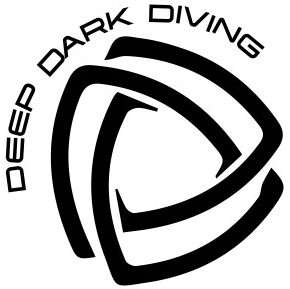- A Quick Overview of Cenote Diving
- Exploring Yucatan's Cenotes: Where to Begin?
- Cenote Hotspots: Puerto Morelos, Playa del Carmen, and Tulum
- Cenote Diving or Cave Diving? The Essentials
- Diving Levels and Safety
- Cenote Gear Essentials: Preparing for the Dive
- The Cenotes Unveiled: A Dive into Diversity
- Snorkeling and Swimming: Cenotes Beyond the Depths
- Planning Your Cenote Adventure: Practical Considerations
- Choosing Your Dive Experience: Dive Centers vs. Independent Instructors
- Best Season, Accommodations, and Beyond: Crafting Your Cenote Adventure
Dive into the Cenotes, the veins of the hearth. These natural sinkholes in the Yucatan Peninsula are filled with crystal-clear water, offering a unique underwater adventure for all divers. Cenote diving is a must in a diver’s lifetime.
Before your trip to Playa del Carmen, remember that good preparation is key, especially regarding cenote diving. A well-planned Yucatan itinerary, including factors like weather, transportation, and accommodation, ensures a smooth and enjoyable adventure.
Find out more about the cenotes of Quintana-Roo and other hidden gems across Yucatan.
With so many Cenotes, you can tailor your cavern diving experience to your preferences, experience, and budget.
A Quick Overview of Cenote Diving
Why is cenote diving so special? The dissolution of limestone bedrock forms these natural sinkholes, creating an intricate network of caves and underground rivers. As freshwater meets saltwater, the mesmerizing halocline phenomenon unfolds, showcasing the stark contrast in density.
The word “cenote” originates from the Mayan word “dzonot” and refers to a location with accessible water. Cenotes were a source of drinking water for the Mayan civilization, and they were revered as such, including some sacrificial rituals.
As cavern ceilings collapsed, certain cenotes transformed into open-air pools, while others experienced partial collapses, resulting in captivating light curtains. The sunlight piercing the pristine water and the geological formations creates an enchanting atmosphere for those exploring these cenotes.
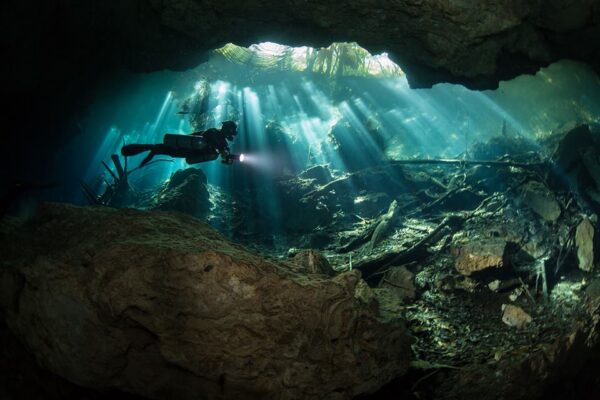
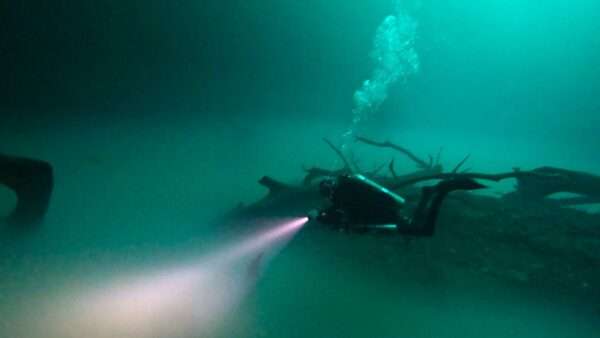
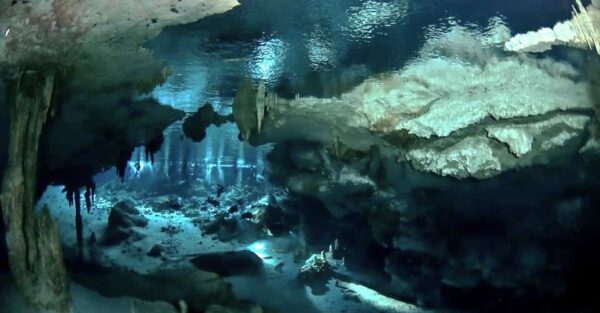
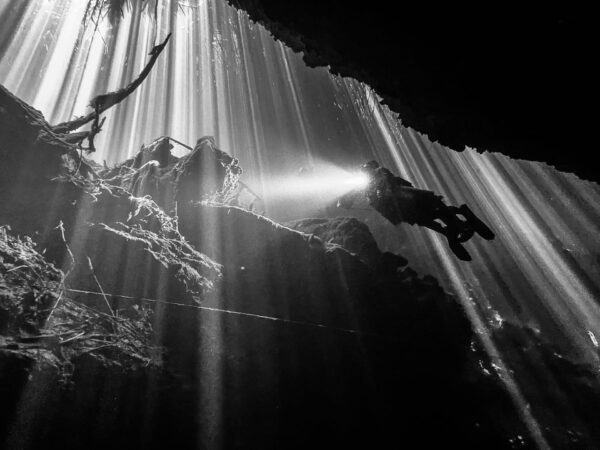
Exploring Yucatan’s Cenotes: Where to Begin?
While cenotes sprinkle Yucatan in surprising locations—streets, beaches, and even next to churches—the quintessential diving experience lies between Tulum and Puerto Morelos, centered around Playa del Carmen, making Playa del carmen the ideal location for your stay if you plan diving Cenotes. You can also extend your cenote adventure to Valladolid for deeper wonders and, for the offbeat, venture south to Bacalar’s lagoon.
Cenote Hotspots: Puerto Morelos, Playa del Carmen, and Tulum
For scuba diving in cenotes, the area from Tulum to Puerto Morelos with Playa del Carmen in the middle, in the State of Quintana-Roo, is where you want to go. You can also extend your cenote experience while visiting Valladolid and its surroundings, swimming in these spectacular cenotes and letting their giant dimensions surprise you. Look up in the trees, and you might see the elegant motmot birds and their blue feathers, which like to nest inside cenotes.
Playa del Carmen steals the spotlight as the cenote capital, boasting names like Dos Ojos, Ponderosa, Taj Ma Ha, and Gran Cenote. Not far behind, Puerto Morelos’ Cenote Zapote and Cenote Maravilla beckon with bell-like stalactites.
Cenote Diving or Cave Diving? The Essentials
Cenote diving doesn’t require cave diving expertise. With visible entrances and daylight throughout, cavern diving ensures a unique experience without venturing into full cave territory. Tailor your dives to your comfort level, buoyed by the crystal-clear freshwater‘s calm currents.
Diving Levels and Safety
Cenote diving remains accessible to diverse experience levels. Beginners, rejoice—select from a variety of cenotes matched to your proficiency. A gradual progression allows you to master buoyancy in the freshwater’s clarity, ensuring a safer and more enjoyable experience.
Cenote Gear Essentials: Preparing for the Dive
Diving in the Cenotes’ Freshwater requires some adjustments. Although a 3mm wetsuit might be enough for a first discovery, we recommend 5mm. Before your dive, your cenote guide will give you some recommendations and help you check your weight, ensuring you don’t bring unnecessary weight that is likely to affect your buoyancy rim. A dive light is also mandatory for safety, communication, and revealing the cenotes’ secrets.
The Cenotes Unveiled: A Dive into Diversity
With their varied geological formations, cenotes captivate divers with stalactites and stalagmites in diverse shapes and lengths. Dos Ojos, a beginner-friendly choice, and Taak Bi Ha, a level 3 challenge, showcase the variety of these underwater wonders.
Snorkeling and Swimming: Cenotes Beyond the Depths
Not a certified diver? Don’t worry—many cenotes welcome snorkelers and swimmers: Casa Cenote’s mangrove river, Gran Cenote, and the Instagram-famous Cenote Suytun.
Planning Your Cenote Adventure: Practical Considerations
To fully enjoy your cenote experience, check the weather. While cenotes remain open year-round, light effects are spectacular under sunny weather. Watch out for camera fees, and plan a budget for capturing these wonders. Scuba diving packages range from $160 to $200, with prices and services often more favorable in Playa del Carmen than in Tulum.
Choosing Your Dive Experience: Dive Centers vs. Independent Instructors
You can choose between dive centers and independent instruction for your Cenote dives. Dive centers like Deep Dark Diving offer dynamic experiences and personalized services and work exclusively with experienced local guides, most even experienced cave instructors. Tailor your choice to your preferences and comfort level.
Best Season, Accommodations, and Beyond: Crafting Your Cenote Adventure
Cenotes are open for diving all year around, with water temperatures of 24°C/76F. Sunny weather offers the best experience, which can happen in any season. Although avoiding the hurricane season from July to October is usually recommended, it can have its charms: less tourism, lower prices, and more availability, snorkeling with whale sharks. But, unfortunately, sometimes there are hurricanes.
Choose your accommodation strategically. Consider the surroundings, avoiding loud bars open all night, proximity to nice restaurants, easy pick-up access, etc.
Contact your operator to learn about the logistics and limit driving times to maximize your cenote exploration.
Embark on an unforgettable journey into the heart of Yucatan’s cenotes. Experienced divers and beginners will enjoy this unique experience: crystal-clear waters and ancient geological formations. Cenotes offer a voyage into the Veins of the Earth.
